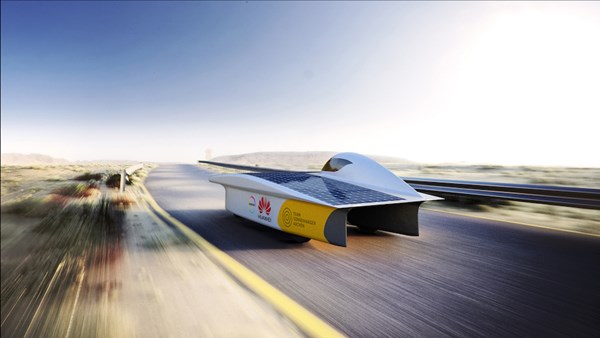Covestro to provide materials to “Sonnenwagen Aachen” team for solar race
The material manufacturer supports the development of a solar-powered electric car with material donations, technical service and as a gold sponsor.

Covestro will take advantage of the Sonnenwagen project to test various materials under the harsh climate conditions prevailing along the race’s route. (Photo credit: Sonnenwagen Aachen).
A group of students at RWTH Aachen University and Aachen University of Applied Sciences are working on developing a solar-powered electric car for the World Solar Challenge 2017 from October 8 to 15 in Australia. The approximately 45 junior researchers established the “Sonnenwagen Aachen e.V.” association, with the support of their professors.
Covestro (Leverkusen, Germany) has cultivated a long-term partnership with the university and is supporting the “Sonnenwagen” (German for “solar car”) project as both a material and technical service provider and Gold Sponsor. The two partners recently signed a cooperation agreement for the project. The Leverkusen-based company is very much familiar with using its materials for solar mobility: As an official partner of the Solar Impulse project, it made a significant contribution to the success of the first manned flight around the globe in an aircraft powered exclusively by solar energy.
Covestro wants to take advantage of the Sonnenwagen project to test various materials under the harsh climate conditions prevailing along the race’s route: temperatures of up to 45 degrees Celsius, high UV radiation and a high air dust content are typical there in October. The most important product application is a three-layer polyurethane coating from PPG (Pittsburgh, Pa.) The coating is particularly suited to application on body parts made of carbon fiber composites.
The climate conditions have a significant impact on the top clearcoat. It is formulated with the bio-based hardener Desmodur eco N 7300 from Covestro, 70 percent of whose carbon content is sourced from biomass.
The Sonnenwagen further incorporates polyurethane and polycarbonate materials from Covestro, which contribute to the lightweight and aerodynamic design of the solar car.
“As sustainability is part of our strategy, we support this ambitious project, in which young researchers want to show that innovative and sustainable mobility concepts are already possible today,” says Markus Steilemann, board member for innovation and chief commercial officer of Covestro. “Solar mobility can make a key contribution to protecting the climate and conserving fossil resources. With our developments and this project partnership, we want to demonstrate our commitment to innovation and sustainability, but also to supporting junior talents.”
The World Solar Challenge is considered to be the toughest solar race on earth and celebrates its 30th anniversary this year. Teams from all over the world compete every two years in their homemade vehicles to win the 3,000 kilometer race from Darwin to Adelaide – without using any fuel.
Related Content
-
JEC World 2023 highlights: Recyclable resins, renewable energy solutions, award-winning automotive
CW technical editor Hannah Mason recaps some of the technology on display at JEC World, including natural, bio-based or recyclable materials solutions, innovative automotive and renewable energy components and more.
-
ASCEND program update: Designing next-gen, high-rate auto and aerospace composites
GKN Aerospace, McLaren Automotive and U.K.-based partners share goals and progress aiming at high-rate, Industry 4.0-enabled, sustainable materials and processes.
-
Plant tour: Daher Shap’in TechCenter and composites production plant, Saint-Aignan-de-Grandlieu, France
Co-located R&D and production advance OOA thermosets, thermoplastics, welding, recycling and digital technologies for faster processing and certification of lighter, more sustainable composites.
















